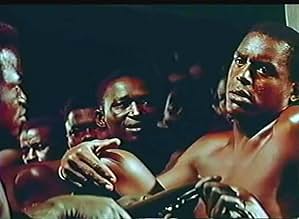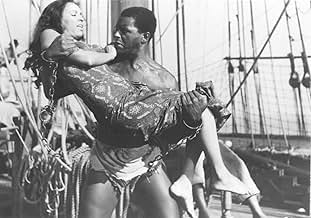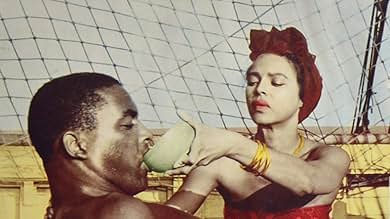Tamango
- 1958
- Tous publics
- 1h 44min
NOTE IMDb
6,5/10
469
MA NOTE
Ajouter une intrigue dans votre langueA Dutch slave captain, on a voyage to Cuba, faces a revolt fomented by a newly captured African slave, Tamango. The slaves capture the captain's mistress, forcing a showdown.A Dutch slave captain, on a voyage to Cuba, faces a revolt fomented by a newly captured African slave, Tamango. The slaves capture the captain's mistress, forcing a showdown.A Dutch slave captain, on a voyage to Cuba, faces a revolt fomented by a newly captured African slave, Tamango. The slaves capture the captain's mistress, forcing a showdown.
- Réalisation
- Scénario
- Casting principal
Avis à la une
"Tamango" is a film which surprised me, as I didn't expect to see such a strong film back in 1958. After all, in some parts of the USA, even in 1958, they would have hesitated to show a film where black men fight and kill their oppressors. It's a shame, as it's a dandy film.
The story begins in West Africa. A tribe is selling their conquered foes to a Dutch slaver (Curd Jurgens). However, among the slaves is a warrior...who also is a charismatic leader. He's determined NOT to make it to where ever the boat is headed and he insists on freeing himself from bondage. Eventually, he and his co-conspirators rise up against the crew and fight for their freedom.
The film is not perfect. I think it actually made the slave ship seem NICE compared to how hellish such boats often were. The same with the cruelty. While severe, I am sure many slave ships treated their 'cargo' much worse. But on the other hand, it's a strong indictment against this evil and is a great film about the human spirit. Well worth seeing...even if the ending is a bit weak.
The story begins in West Africa. A tribe is selling their conquered foes to a Dutch slaver (Curd Jurgens). However, among the slaves is a warrior...who also is a charismatic leader. He's determined NOT to make it to where ever the boat is headed and he insists on freeing himself from bondage. Eventually, he and his co-conspirators rise up against the crew and fight for their freedom.
The film is not perfect. I think it actually made the slave ship seem NICE compared to how hellish such boats often were. The same with the cruelty. While severe, I am sure many slave ships treated their 'cargo' much worse. But on the other hand, it's a strong indictment against this evil and is a great film about the human spirit. Well worth seeing...even if the ending is a bit weak.
The precedent user is right:it's based on a famous short story from Prosper Mérimée.It's strange that the writer's name does not appear in the credits on the IMDb page.Dorothy Dandrige had already been in "Carmen Jones " ,a Bizet opera based on another famous short story by...Prosper Mérimée.
"Tamango" was a failure when it was released and during the sixties,John Berry ,who had made a film noir chef d'oeuvre in the fifties ,"He ran all the way" was relegated to direct French pop star Johnny Hallyday in a forgotten turkey "A Tout Casser" .
"Tamango" is a well-made movie but it is icily impersonal.Aisha's character's evolution is predictable.On the other hand ,there's a good use of the wide screen (cinemascope ) particularly effective when it comes to depict the hold where the slaves cram.The documentary side is the most successful,and "Tamango" can be looked upon as the granddaddy of the "Roots " series in the seventies.Tamango himself is close to Kunta in that 1977 Marvin Chomsky's work.
"Tamango" was a failure when it was released and during the sixties,John Berry ,who had made a film noir chef d'oeuvre in the fifties ,"He ran all the way" was relegated to direct French pop star Johnny Hallyday in a forgotten turkey "A Tout Casser" .
"Tamango" is a well-made movie but it is icily impersonal.Aisha's character's evolution is predictable.On the other hand ,there's a good use of the wide screen (cinemascope ) particularly effective when it comes to depict the hold where the slaves cram.The documentary side is the most successful,and "Tamango" can be looked upon as the granddaddy of the "Roots " series in the seventies.Tamango himself is close to Kunta in that 1977 Marvin Chomsky's work.
I was quite impressed with this film, mostly for the incredible strides forward it made in portraying the horrors of the slave trade and horrific abuse of the kidnapped and enslaved Africans. The epic miniseries Roots, two decades later, and Spielberg's Amistad some 40 years after this film offer more detail and arguably higher production values, but Tamango is well worth watching, especially for those keen on either film or world history. Like another reviewer, I found the acting a little flat, despite the presence of the talented Curd Jurgens and Dorothy Dandridge. But the performances of all were engaging enough for me to want to stick with it to see the resolution of the conflicts. I was also very impressed to see the relationship between CJ's and DD's characters, at a time in the US when white mobs were trying to prevent children of different colors from going to school together, and a decade before the US Loving case forced states to accept marriages between people of different colors.
Arguably more interesting as a social document and a step forward in mainstreams films dealing with race, than as a drama.
On a slave ship carrying Africans from their homeland to slavery in the American south, a charismatic young warrior attempts to organize a revolt. Meanwhile, Dorothy Dandridge plays captain Curt Jurgens' mistress, featuring interracial kissing and sexuality at a time very few American films would go near the subject. Add in the complexity that Dandridge's subjugated Lucy is a far more empathetic figure than any white character, and that Tamango and his fellow captives are show to be in every way – morally, strategically as well as physically better than their white captors, and you have a film that was way ahead of it's time.
That said there is odd flat quality in the drama and less than thrilling acting and film-making that keep the actual story from living up to it's potential. But it's still pretty involving, and worth seeing at least as a part of films' maturing around racial issues.
Interestingly, blacklisted director John Berry, went on to direct another racially 'ahead of it's time' film; 1974's "Claudine", one of the first mainstream American films to try and intelligently deal with the struggles of poor urban African Americans without falling into exploitation, violence or cliché.
On a slave ship carrying Africans from their homeland to slavery in the American south, a charismatic young warrior attempts to organize a revolt. Meanwhile, Dorothy Dandridge plays captain Curt Jurgens' mistress, featuring interracial kissing and sexuality at a time very few American films would go near the subject. Add in the complexity that Dandridge's subjugated Lucy is a far more empathetic figure than any white character, and that Tamango and his fellow captives are show to be in every way – morally, strategically as well as physically better than their white captors, and you have a film that was way ahead of it's time.
That said there is odd flat quality in the drama and less than thrilling acting and film-making that keep the actual story from living up to it's potential. But it's still pretty involving, and worth seeing at least as a part of films' maturing around racial issues.
Interestingly, blacklisted director John Berry, went on to direct another racially 'ahead of it's time' film; 1974's "Claudine", one of the first mainstream American films to try and intelligently deal with the struggles of poor urban African Americans without falling into exploitation, violence or cliché.
"Tamango" is a rousing and intelligent tale of a slave ship revolt in the 18th century. It strives to avoid transparent moralizing and overt stereotypes, particularly by placing the gorgeous Dorothy Dandridge in the pivotal role of the Captain's mistress. She must decide whether to send him to his certain demise among her fellow Africans (as Leonard Maltin avers, it's way ahead of its time). Perhaps this even-handedness is not all that surprising given the fact that it was directed by the blacklisted John Berry, who found refuge in France after helming several sensitive films noirs about the urban American underclass.
Most references give the film's literary source as a novella by French author Prosper Merimée. However, I recently stumbled upon an article in the "New York Times" (August 24, 2005) concerning a South African archaeologist who is combing a beach off Cape Horn for the wreck of a Dutch slave ship named the Meermin. The history given of this particular ship is pretty much a blow-by-blow description of this film (apart from the miscegenation), even down to the very details of how the slaves were given their chance, and how the surviving crew foiled them at one point. I can't remember if the film acknowledges any true-to-life origins, but this shivery narrative certainly lends the movie even more credence.
Most references give the film's literary source as a novella by French author Prosper Merimée. However, I recently stumbled upon an article in the "New York Times" (August 24, 2005) concerning a South African archaeologist who is combing a beach off Cape Horn for the wreck of a Dutch slave ship named the Meermin. The history given of this particular ship is pretty much a blow-by-blow description of this film (apart from the miscegenation), even down to the very details of how the slaves were given their chance, and how the surviving crew foiled them at one point. I can't remember if the film acknowledges any true-to-life origins, but this shivery narrative certainly lends the movie even more credence.
Le saviez-vous
- AnecdotesAt initial release, depiction of interracial romance caused the film to be banned in the United States and in the French colonies.
- ConnexionsFeatured in Biography: Dorothy Dandridge: Little Girl Lost (1999)
Meilleurs choix
Connectez-vous pour évaluer et suivre la liste de favoris afin de recevoir des recommandations personnalisées
- How long is Tamango?Alimenté par Alexa
Détails
- Date de sortie
- Pays d’origine
- Langue
- Aussi connu sous le nom de
- Die schwarze Sklavin
- Lieux de tournage
- Sociétés de production
- Voir plus de crédits d'entreprise sur IMDbPro
- Durée
- 1h 44min(104 min)
- Rapport de forme
- 2.35 : 1
Contribuer à cette page
Suggérer une modification ou ajouter du contenu manquant




























